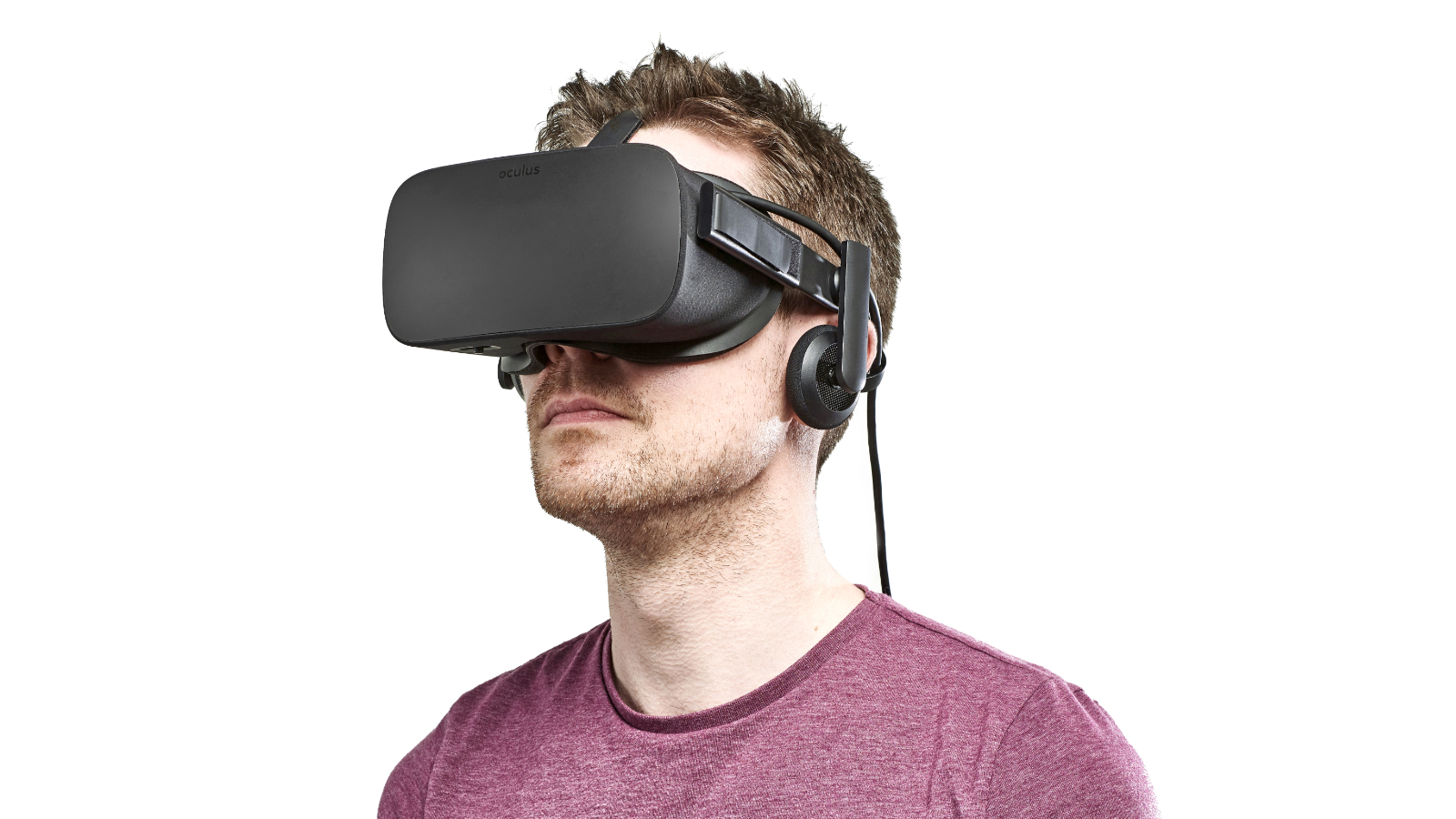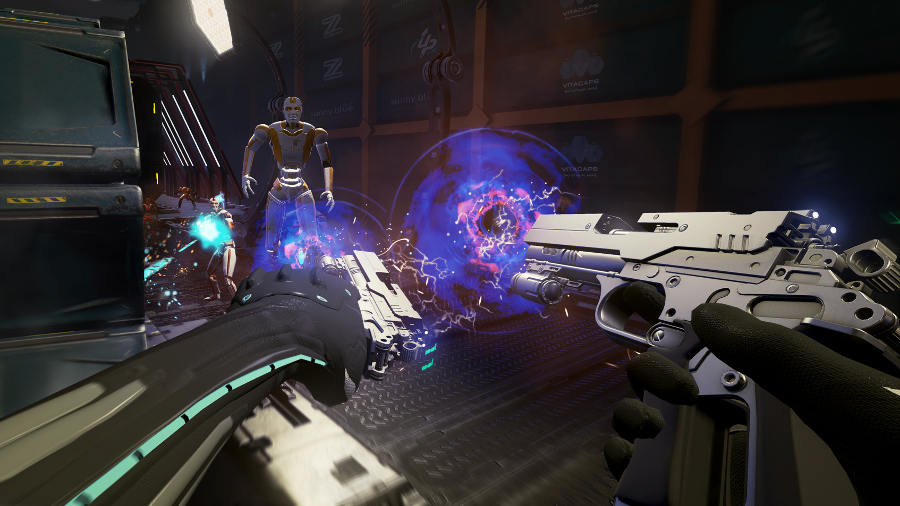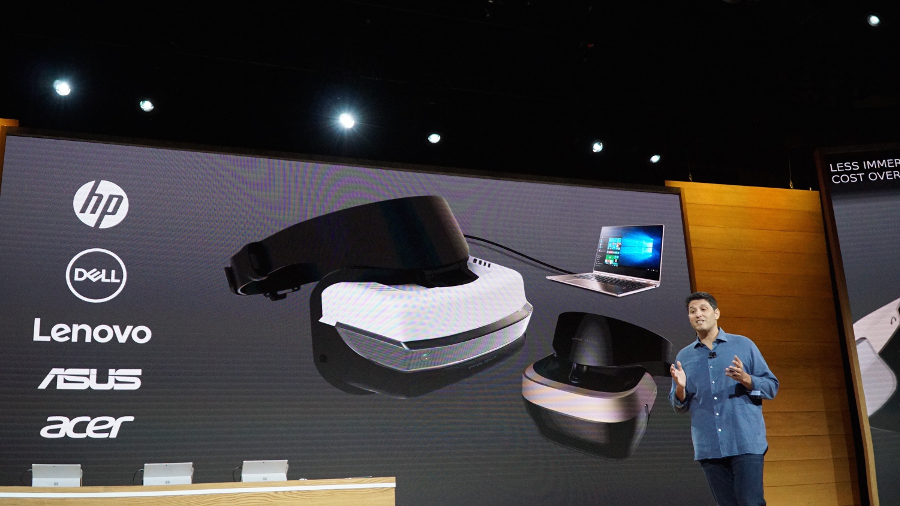Was 2016 the breakthrough year for VR on the PC?
Expectations vs reality

For many people, virtual reality was part of a big predictions list that included meals in pill form, jetpacks, flying cars and living on the moon: something we’ve been promised for decades but will never, ever get. But in 2016 that changed. VR became A Thing You Can Buy - and not just in one flavour. While the Facebook-owned Oculus got most of the headlines, HTC’s Vive was pretty impressive too.
Was 2016 the breakthrough year for VR on the PC? The short answer is “yes”, but the long answer is “sortaaaaa”.
Let us explain.
One Giant Leap
There were plenty of VR milestones in 2016. The first Oculus Rifts shipping were the biggie, of course, and the arrival of the Touch controllers in December was a welcome boost. HTC said it had sold more than 140,000 Vive headsets by November, and in September the Vive-based shooter Raw Data became the first VR game to make a million dollars in a month.

It’s all very impressive, but the most interesting numbers are the ones we don’t know. Oculus won’t say how many Rift headsets it has sold, but admits that they are “far, far from being saturated”. Steam’s November figures report that 0.21% of users have the Vive and 0.13% the Oculus or Oculus Dev Kit.
That’s a lot of people, of course, but it’s a lot less than many analysts predicted: according to Statista, the combined sales of Oculus and Vive would reach 5.7 million by the end of 2016. Unless there’s a really amazing last-minute Christmas rush (we’re writing this before holiday season sales figures have been announced), there’s a huge difference between expectations and reality.
Piotr Iwanicki, founder of Team SUPERHOT, may have an explanation for the lack of PC VR sales so far.
Sign up for breaking news, reviews, opinion, top tech deals, and more.
“VR is still in a place of fantasy, not only in what works or sells, but also in the pure idea,” he told Gamesindustry.biz. “Many people that are excited about VR don’t have a headset. They think about having a headset. It ignites their imagination, but they don’t own one.”
Thankfully, Microsoft may well change that.

Killer apps and why the price isn’t right
PC VR is too expensive for most. Assuming you already have a PC with the requisite power - which not every potential purchaser has - the Oculus Rift is £549 ($599, AU$899 ), rising to £739 or $799 (about AU$1,265) with Touch controllers, and the HTC Vive is £799 ($799, AU$1,399).
It’s hardly surprising that the Sony PSVR (£349/$399/AU$549) and the Gear VR (£99/$99/AU$159) are outselling them by a huge margin.
Enter Microsoft. In October, the company announced a new range of Windows 10 VR headsets from partners including HP, Dell, Lenovo, Asus and Acer. The headsets will be full VR, not augmented/mixed reality like Microsoft’s Hololens, and the most exciting thing about them may well be the price: expect to see headsets costing as little as $299 (about £245, AU$510).
No shipping dates have been announced just yet, but we’re expecting the headsets to arrive alongside the Windows 10 Creators Update in the spring of 2017.
If the headsets are a hit, that’s great news for virtual reality in general: the more potential customers, the more of an incentive there is for developers to create great content - not just games, but VR experiences and new kinds of storytelling too.
That’s important, because while there are plenty of great VR experiences already - Eve: Valkyrie and SUPERHOT on Oculus, Serious Sam on Vive/Steam - we’ve yet to see the platform’s Pokémon Go, the killer app that gets the whole world excited.

War! Huh! What is it good for?
Windows VR would introduce a third VR platform to the PC alongside Oculus and Vive. SteamVR currently works with Oculus, Vive and OSVR, but Steam is an application and online storefront, not an operating system.
With Windows 10 on the other hand, Microsoft intends to directly support a wide range of hardware with its Application Programming Interfaces (APIs) and deliver a consistent interface and a single store. Microsoft says it’ll support all kinds of resolutions and refresh rates, with the only minimum requirement being tracking at least six degrees of freedom, or 6 DoF for short.
Speaking to UploadVR, Microsoft technical fellow of new device categories Alex Kipman said that Oculus and Vive compatibility would be “up to them,” but added: “Bifurcating platforms and bifurcating experiences doesn’t help developers and it doesn’t help customers with choice. The invitation remains open for any headset that is capable of doing 6 DoF, inclusive of HTC and Oculus, but they have to take me up on my invitation.”

Not so HOT
We’d agree with Kipman that incompatible platforms deter developers and confuse consumers, but this kind of format war does appear to be brewing. It’s not so much about the VR content itself, but how we interact with it - so different platforms have different ideas about how to track your movements and how to get your input.
Porting non-interactive VR content from platform to platform is straightforward enough, but having to think about different inputs and tracking systems is a real pain for developers.
Additionally, exclusive VR titles like SUPERHOT are a divisive issue, causing much criticism on Steam community and Reddit. While the developers want the game to be available on all VR platforms, almost everyone is making the content at a loss and require sponsorship like Oculus exclusives.

The developers do sympathize with disappointed Vive owners, though. Writing on Steamcommunity.com, they agree that “permanent exclusives would run a risk of fracturing our budding VR market and making it less attractive to mainstream players."
It's also important to note that SUPERHOT and every single one of the other third-party titles supported by Oculus are TIMED exclusives.
"We’re looking at a bunch of new, high-budget, well executed titles that will end up enriching all VR platforms across the board, even if some players need to exercise a bit of patience and wait for those games for a wee bit longer.”
They’ve got a point: for example, former Oculus exclusive Eve: Valkyrie arrived on the Vive in November.
Was 2016 the breakthrough year on the PC? For early adopters, very much so: if you have the hardware and the cash VR is ready for you. For the rest of us, the breakthrough may take a little longer – and cost a lot less.

Contributor
Writer, broadcaster, musician and kitchen gadget obsessive Carrie Marshall has been writing about tech since 1998, contributing sage advice and odd opinions to all kinds of magazines and websites as well as writing more than twenty books. Her latest, a love letter to music titled Small Town Joy, is on sale now. She is the singer in spectacularly obscure Glaswegian rock band Unquiet Mind.